#with contempt
Explore tagged Tumblr posts
Photo

Psalm 123:3 (NKJV) - Have mercy on us, O LORD, have mercy on us! For we are exceedingly filled with contempt.
60 notes
·
View notes
Text

(Source)
#destiel#twitter#x#brazil#censorship#contempt of court#brazen contempt of court#castiel#dean winchester#breaking news
4K notes
·
View notes
Text

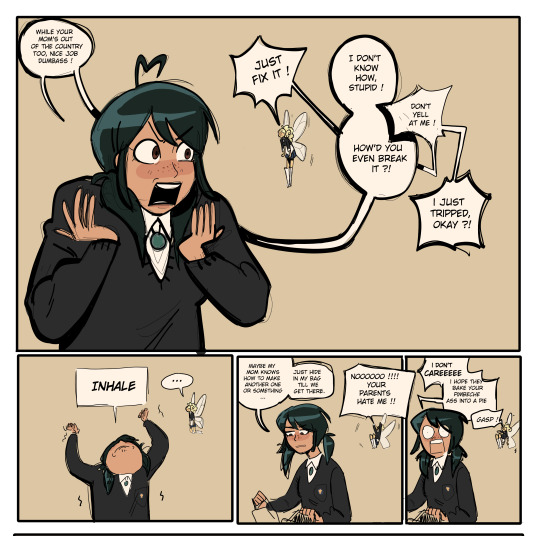
More of the fairy au from last night because it’s what 6 yr old silu would want
#marinette has her necklace and Chloe’s got her brooch :3#they don’t hate her at all btw Tom calls her misstinguette playfully and she has interpreted this as deep contempt for some reason#miraculous ladybug#silu's art#miraculous ladybug and chat noir#mlb fanart#marinette dupain cheng#chloe bourgeois#ml fairy au
2K notes
·
View notes
Text





the two most horribile people you know deserve each other.
tumblr user @/inkskinned / i want you to know that i'm awake/i hope that you're asleep, car seat headrest / familiarity breeds contempt, google / no children, the mountain goats / tumblr user @/willowcrowned
#webweave#webweaving#web weave#web weaving#inkskinned#car seat headrest#csh#familiarity breeds contempt#no children#the mountain goats#willowcrowned#on love#on growing apart#song lyrics#writing#google definitions#text#image#on memories
3K notes
·
View notes
Text
"I've been waiting for ages for somebody to unmask them."

This moment tends to elicit negative reactions in a first read through, and I've got some opinions about why where Kabru is coming from here actually makes a lot of logical sense. So I thought I'd elaborate on that.
I think people hear this and go, "He thinks they must be hiding something because they gave money to someone? What a cynic." Or "he dislikes them because they did charity?? What's wrong with this guy!". And obviously, a lot, a lot is wrong with him. But I think this makes more sense than it seems at first glance! What people evaluating this judgement miss is why Kabru is paying attention to Laios and co to begin with.
Kabru knows of the Touden siblings because (he's a little bit of a stalker-) he is keeping an eye on all the relevant parties in events developing on the island, in order to be able to guide them to his preferred outcome. This includes adventurers because they are the ones actually exploring the dungeon! He's well aware that something as minor as internal tensions between party members could be key to the historical events that are developing. (He would love the assassination of Archduke Franz Ferdinand.)

His desired outcome is that whatever the rewards are of breaking the dungeon's curse, whether that's kingship or the ancient elven secrets of dungeons, are claimed by:
A) a short lived person
B) Someone who will be a good, effective leader and/or use those secrets and the power they carry wisely, with foresight, and to establish a political bloc for short lived people.

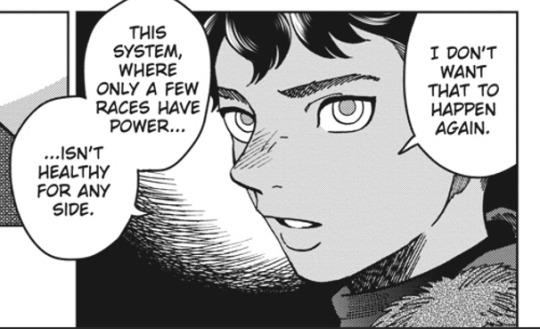
The person he can best trust to do this is, of course, himself. But due to his PTSD regarding dungeons and monsters, he's not able to develop the necessary skills to conquer the dungeon. Once he realises this, he starts looking for someone else who he can support to that end.

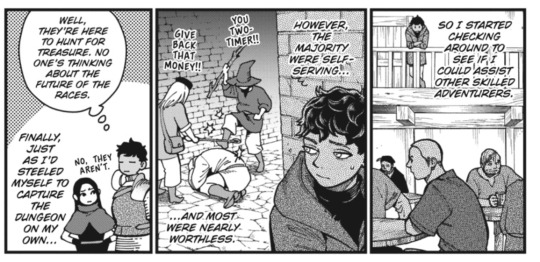
But most of the adventurers don't have any intentions of conquering the dungeon, don't have the skills, or are unsuitable in other ways. In fact, it seems like some potentially suitable people are the Toudens. There are a lot of good rumours about them going around - they actually seem to have a very positive reputation! That's what Kabru means when he says "unmask".



So when Kabru is observing something like them giving money to an old comrade from their gold-peeling days, he doesn't consider it a problem because "they're giving money to this person who doesn't actually need it" or because they must have some dark secret if they act superficially nice. I think he actually understands this situation and what it implies about Laios (in particular) perfectly well.
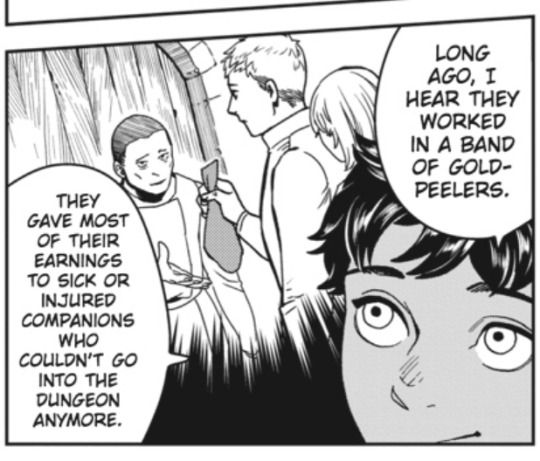
Laios and Falin gave money to an old comrade who got injured and couldn't work. That person then healed up but kept taking their money. Then he used the money to start smuggling illicit goods to the island.
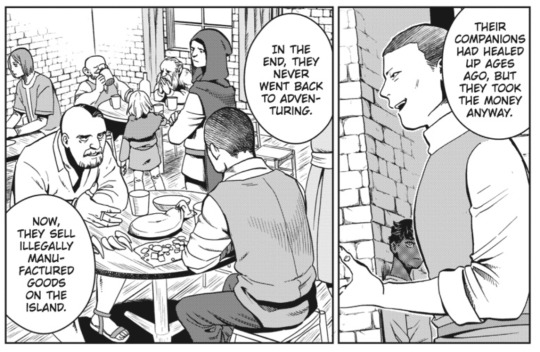
The key is that for Kabru, the problem here is the same as with the corpse retrievers - people using the dungeon's resources to fuel dangerous, selfish, or violent pursuits cause problems for the island, attract more criminals and people with motives other than breaking the curse, and increase the chances of the whole situation ending in tragedy.

Kabru is willing to work with the Shadow Lord of the island if it gets him to his goal - he isn't scrupulous - but the criminal element of the island increasing is something he sees as a major issue.
Also, when you're evaluating someone as a candidate for power, riches, secrets, potentially kingship - then being curious about how the money you give to people is going to be used is kind of a relevant trait!
Interpersonally, Kabru's actually very easygoing - I mean, Mickbell isn't exactly an upstanding guy, is he! But Kabru likes him and they get along well. These traits wouldn't be a problem at all in a friend, or a comrade, or someone Kabru was confident he could use. But he can't get a handle on Laios, and Laios is someone who has the potential to be a major player!
On Laios' end, this is the same as with the marriage seeker who joined their party. She kept asking for things and he gave them to her, because he tries to be nice to others. He even gives her money! It's the exact same thing.

That's fine, but it became a problem because he basically wasn't interested in her motives, didn't notice she was trying to manipulate him, and it also didn't occur to him that the other party members would notice or be affected. We can assume the situation with the gold peeler is the same. When Kabru says that "It's not that they're bad people, they just aren't interested in humans," he isn't wrong.

The extent to which this is true of Laios is linked to his autism imo, (because it isn't just disinterest - he genuinely isn't able to notice nonverbal cues that people are lying to him or have ulterior motives) but to a greater or lesser extent I think it's a very common trait. Most people aren't actually that interested in other people who aren't close to them. Kabru is the weird one here. It isn't an issue except as a leader - which is why we see an immediate comparison to the Island's Lord, because that's how Kabru is evaluating them.
And disinterest in/lack of ability with people to the extent Laios exhibits it, it does, actually, make him a worse leader... it's just that as we see in the story, people can help him out. The rest of the party tell him the marriage seeker is taking advantage of him so he tells her he can't give her special treatment anymore. They're pissed and it's a crisis point - he couldn't have recovered their trust without Marcille and Falin - but that's exactly the point. With Marcille and Falin, he was able to recover their trust.


And he has other good traits that make up for it, such as his intelligence, strategic knowledge, open-mindedness and sense of fairplay.
Kabru doesn't disqualify Laios as a candidate based on what he sees about him from afar, though - he still tries very hard to get close to him, obviously hoping that if he manages he can steer Laios to defeat the dungeon and make up for his lack of people-skills in the aftermath. (Which... he does eventually achieve that goal!) He completely fails until the events of the story, so... definitely I think "They just aren't interested in humans" could also partially be a stung reaction to Laios' complete disinterest in him.

Anyway, that's my read on what exactly Kabru's "issue" with Laios is. Obviously, once he does find out what Laios' true nature is like - about his love for monsters - he develops an entirely new set of fears about Laios' priorities. But since Laios kept that a secret until the start of the story, he has no idea of that yet.
Given all that, I think it's interesting that he says that he doesn't think that the Toudens are suitable to defeat the dungeon, and that he's hoping they'll turn out to be the thieves. As some of his few potential candidates, people who he thinks may play a big role in the island's future, you'd think he'd hope they would be good people!

I suppose it's better, in his eyes, because it means that he's involved in something "interesting". They haven't just had their stuff stolen by regular criminals (boring, puts them further away from his goal) - they've been caught up in the beginning stages of "a historic event". The desperate and dwindling group forgetting morals in their quest to retrieve their lost comrade probably appeals to his sense of melodrama. Because he also just... loves drama.

Despite it being "uglier than anything he was expecting", he still pursues Laios as the person he wants to conquer the dungeon pretty much as soon as it becomes clear that he won't be able to do it himself and they are out of time. That's because... well, to be fair, there aren't any other options. And he fits standard A: he's short-lived!


and Kabru still hopes he can fit standard B, too, and be persuaded to use the power he wins for good. No matter how many nightmares he has about Laios, or whether he thinks about killing him. He doubts him, but ultimately he puts his faith in him and seems happy after the manga's ending that he made the right decision.

#dungeon meshi#dungeon meshi manga spoilers#dungeon meshi meta#kabru of utaya#laios touden#labru#laios x kabru#dunmeshi#og post#kabru is such a big picture thinker. and he evaluates people more than he judges them imo#the hater jokes are funny but the people he judges most harshly arent laios and co. they're people like the island's lord.#but you don't see that as clearly because he isn't interested in the island's lord. he understands him. finds him contemptible but useful.#whereas laios lives in his brain rent free because he WANTS to understand him but doesnt quite.#even though he sees the elves as a major threat to his ultimate goals and dislikes the way they treat short lived races#he still understands and evaluates mithrun as an individual based on his own merits#he's one of the characters who is least judgemental in that sense because while he's always making judgements and evaluations#he's also constantly revising them whenever he gets more information#my beautiful machiavellian prince <3#it's genuinely a really laudable way of understanding others imo.#the only problem is that because he's driven towards his goals by his PTSD and survivors guilt#he pushes himself into situations (the dungeon and also interpersonally) that trigger him or even just upset him#without regard for what he authentically wants or his own wellbeing.
4K notes
·
View notes
Text
How lock-in hurts design

Berliners: Otherland has added a second date (Jan 28) for my book-talk after the first one sold out - book now!

If you've ever read about design, you've probably encountered the idea of "paving the desire path." A "desire path" is an erosion path created by people departing from the official walkway and taking their own route. The story goes that smart campus planners don't fight the desire paths laid down by students; they pave them, formalizing the route that their constituents have voted for with their feet.
Desire paths aren't always great (Wikipedia notes that "desire paths sometimes cut through sensitive habitats and exclusion zones, threatening wildlife and park security"), but in the context of design, a desire path is a way that users communicate with designers, creating a feedback loop between those two groups. The designers make a product, the users use it in ways that surprise the designer, and the designer integrates all that into a new revision of the product.
This method is widely heralded as a means of "co-innovating" between users and companies. Designers who practice the method are lauded for their humility, their willingness to learn from their users. Tech history is strewn with examples of successful paved desire-paths.
Take John Deere. While today the company is notorious for its war on its customers (via its opposition to right to repair), Deere was once a leader in co-innovation, dispatching roving field engineers to visit farms and learn how farmers had modified their tractors. The best of these modifications would then be worked into the next round of tractor designs, in a virtuous cycle:
https://securityledger.com/2019/03/opinion-my-grandfathers-john-deere-would-support-our-right-to-repair/
But this pattern is even more pronounced in the digital world, because it's much easier to update a digital service than it is to update all the tractors in the field, especially if that service is cloud-based, meaning you can modify the back-end everyone is instantly updated. The most celebrated example of this co-creation is Twitter, whose users created a host of its core features.
Retweets, for example, were a user creation. Users who saw something they liked on the service would type "RT" and paste the text and the link into a new tweet composition window. Same for quote-tweets: users copied the URL for a tweet and pasted it in below their own commentary. Twitter designers observed this user innovation and formalized it, turning it into part of Twitter's core feature-set.
Companies are obsessed with discovering digital desire paths. They pay fortunes for analytics software to produce maps of how their users interact with their services, run focus groups, even embed sneaky screen-recording software into their web-pages:
https://www.wired.com/story/the-dark-side-of-replay-sessions-that-record-your-every-move-online/
This relentless surveillance of users is pursued in the name of making things better for them: let us spy on you and we'll figure out where your pain-points and friction are coming from, and remove those. We all win!
But this impulse is a world apart from the humility and respect implied by co-innovation. The constant, nonconsensual observation of users has more to do with controlling users than learning from them.
That is, after all, the ethos of modern technology: the more control a company can exert over its users ,the more value it can transfer from those users to its shareholders. That's the key to enshittification, the ubiquitous platform decay that has degraded virtually all the technology we use, making it worse every day:
https://pluralistic.net/2023/02/19/twiddler/
When you are seeking to control users, the desire paths they create are all too frequently a means to wrestling control back from you. Take advertising: every time a service makes its ads more obnoxious and invasive, it creates an incentive for its users to search for "how do I install an ad-blocker":
https://www.eff.org/deeplinks/2019/07/adblocking-how-about-nah
More than half of all web-users have installed ad-blockers. It's the largest consumer boycott in human history:
https://doc.searls.com/2023/11/11/how-is-the-worlds-biggest-boycott-doing/
But zero app users have installed ad-blockers, because reverse-engineering an app requires that you bypass its encryption, triggering liability under Section 1201 of the Digital Millennium Copyright Act. This law provides for a $500,000 fine and a 5-year prison sentence for "circumvention" of access controls:
https://pluralistic.net/2024/01/12/youre-holding-it-wrong/#if-dishwashers-were-iphones
Beyond that, modifying an app creates liability under copyright, trademark, patent, trade secrets, noncompete, nondisclosure and so on. It's what Jay Freeman calls "felony contempt of business model":
https://locusmag.com/2020/09/cory-doctorow-ip/
This is why services are so horny to drive you to install their app rather using their websites: they are trying to get you to do something that, given your druthers, you would prefer not to do. They want to force you to exit through the gift shop, you want to carve a desire path straight to the parking lot. Apps let them mobilize the law to literally criminalize those desire paths.
An app is just a web-page wrapped in enough IP to make it a felony to block ads in it (or do anything else that wrestles value back from a company). Apps are web-pages where everything not forbidden is mandatory.
Seen in this light, an app is a way to wage war on desire paths, to abandon the cooperative model for co-innovation in favor of the adversarial model of user control and extraction.
Corporate apologists like to claim that the proliferation of apps proves that users like them. Neoliberal economists love the idea that business as usual represents a "revealed preference." This is an intellectually unserious tautology: "you do this, so you must like it":
https://boingboing.net/2024/01/22/hp-ceo-says-customers-are-a-bad-investment-unless-they-can-be-made-to-buy-companys-drm-ink-cartridges.html
Calling an action where no alternatives are permissible a "preference" or a "choice" is a cheap trick – especially when considered against the "preferences" that reveal themselves when a real choice is possible. Take commercial surveillance: when Apple gave Ios users a choice about being spied on – a one-click opt of of app-based surveillance – 96% of users choice no spying:
https://arstechnica.com/gadgets/2021/05/96-of-us-users-opt-out-of-app-tracking-in-ios-14-5-analytics-find/
But then Apple started spying on those very same users that had opted out of spying by Facebook and other Apple competitors:
https://pluralistic.net/2022/11/14/luxury-surveillance/#liar-liar
Neoclassical economists aren't just obsessed with revealed preferences – they also love to bandy about the idea of "moral hazard": economic arrangements that tempt people to be dishonest. This is typically applied to the public ("consumers" in the contemptuous parlance of econospeak). But apps are pure moral hazard – for corporations. The ability to prohibit desire paths – and literally imprison rivals who help your users thwart those prohibitions – is too tempting for companies to resist.
The fact that the majority of web users block ads reveals a strong preference for not being spied on ("users just want relevant ads" is such an obvious lie that doesn't merit any serious discussion):
https://www.iccl.ie/news/82-of-the-irish-public-wants-big-techs-toxic-algorithms-switched-off/
Giant companies attained their scale by learning from their users, not by thwarting them. The person using technology always knows something about what they need to do and how they want to do it that the designers can never anticipate. This is especially true of people who are unlike those designers – people who live on the other side of the world, or the other side of the economic divide, or whose bodies don't work the way that the designers' bodies do:
https://pluralistic.net/2022/10/20/benevolent-dictators/#felony-contempt-of-business-model
Apps – and other technologies that are locked down so their users can be locked in – are the height of technological arrogance. They embody a belief that users are to be told, not heard. If a user wants to do something that the designer didn't anticipate, that's the user's fault:
https://www.wired.com/2010/06/iphone-4-holding-it-wrong/
Corporate enthusiasm for prohibiting you from reconfiguring the tools you use to suit your needs is a declaration of the end of history. "Sure," John Deere execs say, "we once learned from farmers by observing how they modified their tractors. But today's farmers are so much stupider and we are so much smarter that we have nothing to learn from them anymore."
Spying on your users to control them is a poor substitute asking your users their permission to learn from them. Without technological self-determination, preferences can't be revealed. Without the right to seize the means of computation, the desire paths never emerge, leaving designers in the dark about what users really want.
Our policymakers swear loyalty to "innovation" but when corporations ask for the right to decide who can innovate and how, they fall all over themselves to create laws that let companies punish users for the crime of contempt of business-model.
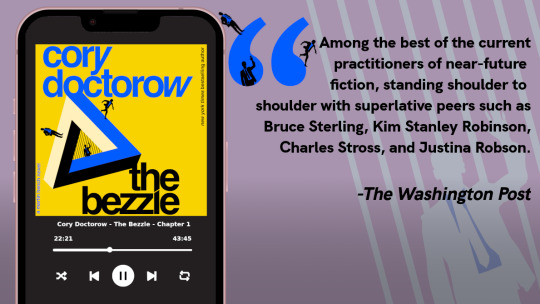
I'm Kickstarting the audiobook for The Bezzle, the sequel to Red Team Blues, narrated by @wilwheaton! You can pre-order the audiobook and ebook, DRM free, as well as the hardcover, signed or unsigned. There's also bundles with Red Team Blues in ebook, audio or paperback.

If you'd like an essay-formatted version of this post to read or share, here's a link to it on pluralistic.net, my surveillance-free, ad-free, tracker-free blog:
https://pluralistic.net/2024/01/24/everything-not-mandatory/#is-prohibited

Image: Belem (modified) https://commons.wikimedia.org/wiki/File:Desire_path_%2819811581366%29.jpg
CC BY 2.0 https://creativecommons.org/licenses/by/2.0/deed.en
#pluralistic#desire paths#design#drm#everything not mandatory is prohibited#apps#ip#innovation#user innovation#technological self-determination#john deere#twitter#felony contempt of business model
3K notes
·
View notes
Text

Indifference
#messyr#familiarity breeds contempt#artists on tumblr#hazbin hotel#doodle#hazbin hotel au#hazbin hotel human au#hazbin hotel lucifer#lucifer morninstar#hazbin hotel: michelin stars au#HH:MS [FILLERS]
1K notes
·
View notes
Note
same height struggles..
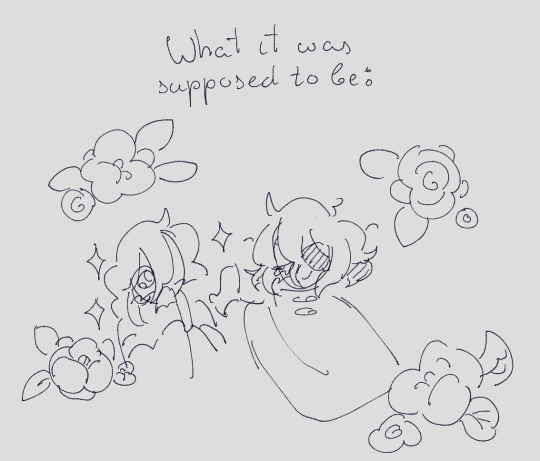

Day 71: kabeDON'T
#in stars and time#isat#sifloop#isat siffrin#siffrin isat#isat loop#loop isat#desert art#isat spoilers#human loop#sifloop typical miscommunication#loop why are you silent!!!!!#bitches can't show anything aside from blinding rage immeasurable sadness and searing contempt#/lie
586 notes
·
View notes
Text
imogen: you trust predathos because you’ve talked to it? 🥺 you’ve had lots of conversations and you know what they’re saying is the truth? 🥺 should we throw a party? should we invite the face-eating leopards
#critical role#cr spoilers#bh#imogen temult#ludinus da'leth#the CONTEMPT in her voice is everything to me
995 notes
·
View notes
Text


Le mépris , Jean-Luc Godard , 1963.
2K notes
·
View notes
Text


Le Petit Soldat
#le petit soldat#anna karina#jean luc godard#godard#michel subor#vivre sa vie#masculin feminin#breathless#alphaville#contempt#60s#60s icons#vintage#film#cinema#60s film#60s fashion#cinephile#french cinema#cinematography#film noir#films#french films#film stills#black and white film#classic film#movie screencaps#movie quotes#film quotes#frenchnewwaves
2K notes
·
View notes
Text
this week the doctor and ruby try not to punch a rich bitch for forty five minutes
#doctor who#dw#dr who#15th doctor#fifteenth doctor#ruby sunday#doctor who series 14#dot and bubble#they’re stronger than me lindy pepper-bean would have have catching these hands#i know my girl ruby would’ve come in swinging#both of their looks of contempt are so lovely though
1K notes
·
View notes
Text
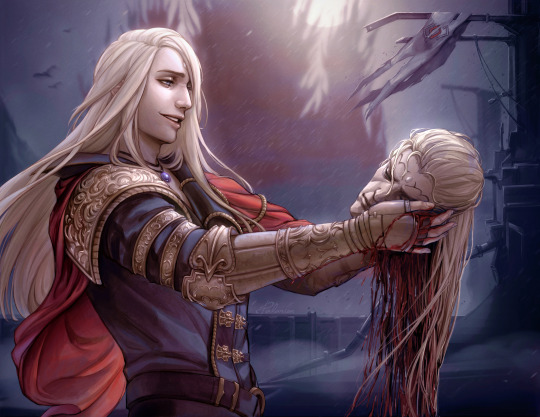
Zenos for a Zenos-centric zine! Leftover sales begin October 18th 💖
#tried to capture the contempt he likely held for his father and nation...#i say 'likely' bc this was a while ago and i've forgotten many of my headcanons for the galvuses lol. i miss them...#anyway this was a spread! that's why the center is Empty 💃#(gaiaryne pls come save my artwork it's leaking aether)#ffxiv#ff14#zenos#zenos yae galvus
479 notes
·
View notes
Text

soundwave x starscream to me, featuring seal ravage
#soundstar#is that the ship name ??#soundwave admiring ravages ability to seal while starscream seethes with hatred & contempt for megatron#soundwave#starscream#ft#ravage#transformers#maccadam
268 notes
·
View notes
Text

France Gall doing her makeup, 1960s
#this is a girlblog#vintage fashion#girlblogging#marilyn monroe#vintage aesthetic#jane birkin#lana del rey#1960s#1960s fashion#lana del rey aesthetic#girlsofthesixties#ye ye girl#france gall#jean luc godard#contempt#brigitte bardot#swinging 60s#swinging london#swinging sixties#girlhood#girlblogger#just girly things#this is what makes us girls#vintage coquette#coquette#coquette aesthetic#dollette#girlblog#girly stuff#girly aesthetic
622 notes
·
View notes
Text




#columbo#season 1#prescription murder#older columbo would've heard this chillingly soulless admission and just rubbed the back of his head and equivocated with a smile#young columbo hasn't learned to do that yet he can hardly conceal the magnitude of his contempt for someone like this
388 notes
·
View notes